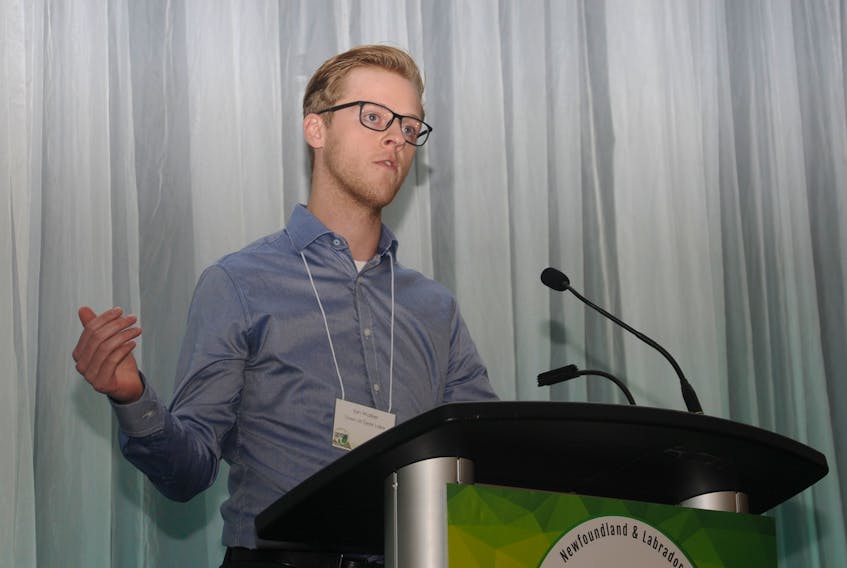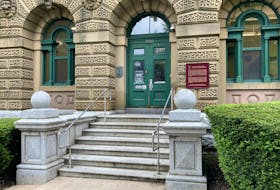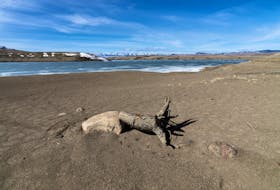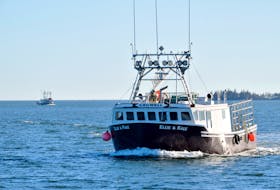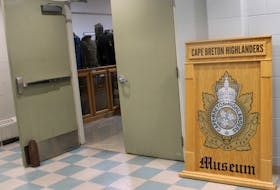ST. JOHN'S, N.L. — The effects of a devastating winter flood gave the Town of Deer Lake a lot to think about, according to the municipality's climate change co-ordinator.
In January 2018, a thaw followed by heavy rain caused the Humber River to overflow, flooding many parts of the western Newfoundland town of 5,200 residents. It caused substantial erosion along the riverbank.

"That was kind of a wake-up call for the community, and several steps have been taken since then," Ian Walker told attendees of the Newleef Clean Technology and Green Economy Conference, which got underway Wednesday in St. John's.
The Newfoundland and Labrador Environmental Industry Association holds the two-day event.
Walker was one of several speakers who shared information with conference attendees about what municipalities in Newfoundland and Labrador are doing to address climate change. A lot of this work is geared toward reducing greenhouse gas emissions through a variety of initiatives.
There are now 20 communities on the island portion of the province engaged in such work, with funding programs giving them over $1 million to assist with the development of plans to act on.
Jess Puddister, a municipal climate change adviser with the Conservation Corps of Newfoundland and Labrador, has worked with some of those towns. She said many town councillors in this province did not grow up learning about the effects of climate change, and it is important for municipalities to assess their vulnerability and consider options to adapt and mitigate its impact. This will ultimately aid in the formulation of an action plan, she added.
"The impacts of a 1.5 C increase in temperature (by 2030-32) will be felt across ecosystems, communities and economies — we're all going to feel it," Puddister said. "But not all hope is lost. There's still time to respond to this in a reasonable way. Warming that's been caused by past and ongoing emissions will persist. ... It's the emissions we're putting out between now and then that's really going to make the difference."
Puddister said greenhouse gas emissions need to be cut in half within the next 10-15 years.
Piers Evans, climate change co-ordinator for the Town of Portugal Cove-St. Philip's, said that town identified a need for sustainable development goals in its last municipal plan.
Since Evans moved into his position, which is funded through the Federation of Canadian Municipalities (FCM), the town has begun assessing where it stands when it comes to emissions at both a corporate and community level through inventories.
"These sorts of inventories reveal the opportunities that exist out there — through electrification (of heating systems), looking at fleets and vehicle idling studies, looking at waste and diversion strategies and building energy audits — in order to find those efficiencies that will lead to lowering our emissions and likely also saving the town money in its operations," he said.

The Town of Bauline has a long-term vision to realize savings, Coun. Chris Palmer said.
Bauline is looking to set up 100 solar panels at the local community centre and town hall, supplemented by a 10-kilowatt turbine. This would power the building and potentially generate excess electricity. This system would be backed up by a bank of batteries to keep the building going as a warming centre for two to three days in the event of an emergency.
"For a small town, it's quite a financial commitment," Palmer said, noting the town hopes to be ready to develop an installation plan in 2020.
Edmundo Fausto, a sustainability officer for the City of St. John's, said the city has identified risks and completed corporate and community inventories.
An inter-departmental working group has been established to address climate change, and the city is also working to create an expert panel to assist council, Fausto said, adding that the city is reviewing its climate projections.
The 20 communities engaged in climate change planning in Newfoundland have shared ideas and brainstormed at times, said Ashley Smith, managing director of a consulting firm called
Fundamental Inc. that works with several of those towns.
"All 20 of the communities are partners in this, and they're all working together," she said, adding that those municipalities are putting together a joint funding proposal for FCM to create an eco-asset management program.
Twitter: @CBNAndrew
Greenhouse gas emission facts
- Canada accounts for two per cent of global emissions (2015)
- Canada is fourth globally in emissions per capita (2015)
- Newfoundland and Labrador accounts for 1.5 per cent of Canada's emissions (2017)
Source: Government of Canada
RELATED
- IN-DEPTH: Climate Change Economy
- IN-DEPTH: Rising Seas

